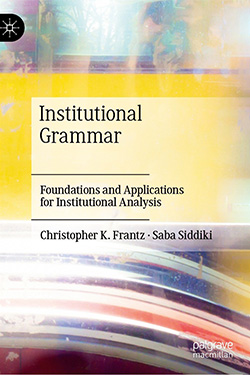Institutional Grammar: Foundations and Applications for Institutional Analysis
Saba Siddiki, Christopher K. Frantz
Palgrave Macmillan, January 2022

Saba Siddiki, associate professor of public administration and international affairs and Chapple Family Professor of Citizenship and Democracy, is author of a new book, “Institutional Grammar: Foundations and Applications for Institutional Analysis” (Palgrave Macmillan, 2022).
The book provides a general background on institutional analysis and institutional grammar (IG), both of which are approaches applied to understand the design and impact of institutions, or rules, used in governance. In addition to providing an introduction to these approaches, the book offers a comprehensive overview of a revised version of the IG developed by the authors, called the IG 2.0. The IG 2.0 is particularly well-suited for studying policy design drawing on diverse theoretical and analytical approaches, Siddiki says.
Siddiki joined the Maxwell School in 2017. Her research examines the designs of institutions that communities use to solve public problems and how governments engage non-governmental organizations and citizens in public problem solving, policy design and policy implementation.
She leads Maxwell’s master of public administration program and is the founding director of the new Center for Policy Design and Governance, the Computational Institutional Science Lab and the Institutional Grammar Initiative. She earned a Ph.D. in public affairs from the University of Colorado in 2011.
From the publisher:
This book provides a comprehensive introduction to the Institutional Grammar (IG), an approach for analysing the design of institutions. To lay the foundation for the application of the “Grammar” for different application areas, the book first provides a background of the IG, before motivating the introduction of an updated version of the Institutional Grammar, called the Institutional Grammar 2.0 that aims at representing institutions more comprehensively and with greater validity.
The book then turns to applications and introduces methodological guidance alongside expositions of emerging analytical applications of the “Grammar” that include presentations of current practice, as well as developing novel analytical opportunities that analysts of diverse disciplinary backgrounds and interest can apply or build upon for their application.
Published in the Fall 2022 issue of the Maxwell Perspective